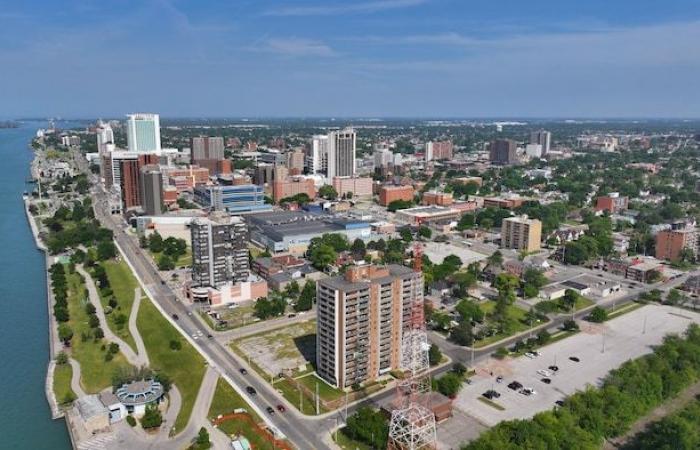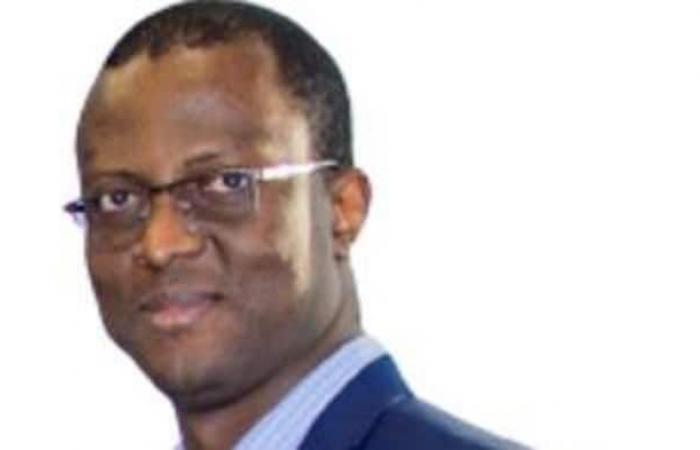“I’m afraid to talk about retirement because I haven’t had time to prepare for it,” says David Mboli, who arrived in Canada in 2008, when he was in his forties.
After his master’s degree, he did not have the chance to practice in his chosen field. He settled for low-paid odd jobs. He did not work and save enough to be able to benefit from a retirement that would allow him to live adequately, he says.
David Mboli will also have to continue to provide for the needs of his family remaining in his country of origin, the Democratic Republic of Congo.
We didn’t have time to save. It was extremely difficult.
David Mboli is not the only one in this situation. There fear
and uncertainty related to retirement predominate among immigrants in their sixties encountered in the Windsor, Ontario region.
Open in full screen mode
23% of the population of the border town of Windsor has an immigrant background, according to the 2021 census.
Photo : Radio-Canada / Patrick Morrell
Those who have not saved enough work after age 65 while continuing to financially support their family back home. Others seek to limit expenses
to save money and are even evaluating the possibility of returning to their country of origin.
We are in a world of uncertainty
adds Weber Kumba. He is also in his sixties and has lived in Canada for around thirty years.
The contribution is not high enough to have a good retirement. We see that the cost of living has become very expensive
he explains.
When you haven’t been prepared for retirement, it comes as a surprise with the weight of age. It gets complicated.
Many of the people he knows from immigrant backgrounds, especially of African origin, are struggling to pay bills. Saving for retirement is not one of their worries
he recalls.
Everyone has their own strategy: sport, return to their country of origin, limit expenses
Weber Kumba does not think he can work beyond the age of 65. He has nevertheless put in place certain initiatives that will allow him to breathe when retirement time comes.
I limit my spending
he explains. He also claims to have an activity plan to stay active.
I will be retired from my job and my employer. I will have activities to do
he said.
If you don’t have activities to do, you will have health problems, depression and especially mental health problems.
David Mboli, for his part, plans to settle in another African country for fear of returning to his native Congo without sufficient resources.
Open in full screen mode
Many immigrants are unaware of the existence of several financial products to prepare for their retirement when they arrive in Canada. (Archive photo)
Photo: The Canadian Press / Spencer Colby
In Africa, it’s a village. When you come back from here [Canada]everyone is behind you. You wake up, there are still people [qui viennent vous demander de l’aide financière].
I will have yet another form of stress
he points out.
According to David Mboli, it is difficult to convince people that someone who has lived in Canada for a long time is deprived of financial resources. We find ourselves facing another dead end
he concludes.
Become financially informed and educated
According to André Félix Bakehe, director and co-founder of the organization Immigrant Financial Fitnesswhich among other things popularizes financial literacy online among new immigrants across the country, we must get rid of this perception where we tend to think that financial literacy is a matter for categories of people with significant income.

Open in full screen mode
“We must live in Canada like Canadians and not transpose fears from our countries of origin to Canada because the system is different,” says André Félix Bakehe
Photo: Submitted by André Félix Bakehe
You cannot prepare for retirement if you do not understand how the system works, if you do not understand the tools that are in place
explains Mr. Bakehe.
According to him, there is an urgent need to be informed and educated. According to Mr. Bakehe, the adoption of small habits promoting savings is essential to avoid being confronted later with a nightmare retirement
. One of them consists of save first before spending
he explains.
In general, the category of low-income people also sometimes stands, for many of them, sufficiently far from anything that can be financial literacy.
According to Yves Laberge, sociologist and professor at the University of Ottawa, awareness of the notions of savings is necessary at each stage of professional life.
People need to be made aware of the virtues of saving and financial planning which can be done at all times of life, and not just when you are in the middle of your life or at the end of your career.
he explains.
When we say education, it is not only in universities, in schools, but also in the family environment.
The fear of retirement, however, is not exclusive to immigrant populations alone, recalls Mr. Laberge.
Many Canadians also share these concerns about retirement, about the future, about their ability to work beyond retirement.
notes the sociologist.
For example, Canadians estimated in 2023 that they would need $1.7 million to retire according to a survey by BMO Financial Group.








